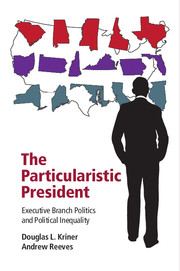Book contents
- Frontmatter
- Contents
- List of Tables
- List of Illustrations
- Acknowledgments
- 1 Introduction
- 2 The Origins of Presidential Particularism
- 3 Base Closings and Trade
- 4 Disaster Declarations and Transportation Grants
- 5 Federal Grants and Presidential Particularism
- 6 The Electoral Rewards of Presidential Particularism
- 7 Conclusion
- Appendix A Technical Appendix to Chapter 3
- Appendix B Technical Appendix to Chapter 4
- Appendix C Technical Appendix to Chapter 5
- Appendix D Technical Appendix to Chapter 6
- References
- Index
6 - The Electoral Rewards of Presidential Particularism
Published online by Cambridge University Press: 05 June 2015
- Frontmatter
- Contents
- List of Tables
- List of Illustrations
- Acknowledgments
- 1 Introduction
- 2 The Origins of Presidential Particularism
- 3 Base Closings and Trade
- 4 Disaster Declarations and Transportation Grants
- 5 Federal Grants and Presidential Particularism
- 6 The Electoral Rewards of Presidential Particularism
- 7 Conclusion
- Appendix A Technical Appendix to Chapter 3
- Appendix B Technical Appendix to Chapter 4
- Appendix C Technical Appendix to Chapter 5
- Appendix D Technical Appendix to Chapter 6
- References
- Index
Summary
The fault, dear Brutus, is not in our stars, But in ourselves …
– William Shakespeare's Julius Caesar (I, ii, 140–141)Throughout this book, we find compelling evidence that presidents target federal dollars to electorally valuable constituencies, inducing economic inequality among the communities that find themselves as political winners or losers. Thus far, we have speculated that presidents are motivated to pursue this behavior because voters, perhaps shortsightedly, reward them for it. While considering the state of the national economy and the competency with which the president runs the executive branch, voters are also rewarding presidents at the ballot box for increased levels of spending in their communities. This is not the usual lens through which scholars, pundits, or journalists view presidential accountability. Additionally, our contemporary era is one in which government spending in the face of massive deficits is a highly politicized issue. National, not local, factors are supposed to dominate presidential electoral politics. Moreover, public opinion polls repeatedly tell us that most Americans believe that government is too big, that Washington wastes too many tax dollars, and that federal spending should be reduced. In a December 2013 Pew poll, a near-majority of Americans (49 percent) replied that it was more important to cut spending and reduce the deficit than to increase spending to spur economic recovery. In a Fox News poll conducted in October, 86 percent of Americans believed that the federal “government could spend less and save more without hurting people.” In a May 2013 poll, 54 percent of Americans, when asked whether the 2014 budget should feature increased or decreased levels of spending compared with the preceding year, favored spending cuts, versus only 16 percent who preferred more federal spending. This raises the specter that voters may view local federal spending as waste and be more likely to punish than reward politicians for it.
Even though they may oppose spending in the abstract and in the aggregate, how will Americans respond to federal spending within their local communities? Will opposition remain high? And will they credit the commander-in-chief for new airport runways, remodeled hospital wings, and repaired highway spans? We first seek insight into these questions through an original survey experiment.
- Type
- Chapter
- Information
- The Particularistic PresidentExecutive Branch Politics and Political Inequality, pp. 147 - 170Publisher: Cambridge University PressPrint publication year: 2015

